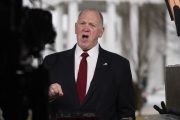
The NAFTA Superhighway is a term coined by critics of a plan to create a massive new North American transportation/trade corridor system intended to handle the anticipated increased flow of Chinese and other foreign goods into our country. This is not “just another highway.” The Trans Texas Corridor (TTC), already under construction, will be part of the system. According to the Texas Department of Transportation, it will, at points, include “separate lanes for passenger vehicles and large trucks; freight railways; high-speed commuter railways; infrastructure for utilities including water lines, oil and gas pipelines; and transmission lines for electricity, broadband and other telecommunications services.” And though Texas Governor Rick Perry is disinclined to tell Texans about the true purpose of the TTC (in Texas, he says that it is needed to improve that state’s economy and relieve traffic congestion), he is not so shy when he is in Mexico. In August, Perry held meetings in Mexico with Jose Natividad Gonzales Paras, the governor of a Mexican state. Investigative journalist Jerome Corsi discovered a Mexican government website that quoted Paras as saying: “We have had a very productive relationship with Rick Perry, who is also interested in what we can do to continue that which is known as the Trans-Texas Corridor, that in reality is the corridor of North America, the Trans North America Corridor.”
Using the new system, Mexican freight drivers, carrying mainly Chinese imports from Mexican ports and using FAST lanes much like the EZ Pass system now used on many U.S. tollways, will be able to cross the U.S. borders without being checked by U.S. Customs. According to proponents of this “trade corridor,” such as the North America’s Super Corridor Coalition, Inc. (NASCO), a new transportation system is needed “to improve both the trade and competitiveness and quality of life in North America.” But such a system cannot possibly end up being good for Americans. In an odd twist, one of the saving graces stopping our trade deficit from being even worse is the fact that our country’s deepwater ports, used for bringing imports into the United States, are at capacity. They cannot keep up.
According to NASCO, “U.S. studies forecast national freight tonnage to increase nearly 70 percent by 2020.” Anticipating this, new ports are scheduled to be opened in Mexico, with a large port already under construction at Lazaro Cardenas, to facilitate shipments into “North America” — in other words, into the two countries in North America that can purchase the items: the United States and Canada. Mexico simply does not have the wherewithal to buy an amount of goods to justify such an investment in infrastructure. Thereby, cheap Mexican dockworkers and truckers can be substituted for expensive U.S. labor, causing American truckers and longshoremen to lose their jobs. Driving distance in getting to locations in the central United States could also be shortened. Hence, transportation costs drop for imports.
The building of such a trade-corridor system would be unnecessary if our government would stop instituting policies that defeat and discourage U.S. manufacturing competitiveness. As it is now, ships are leaving U.S. docks virtually empty. Yvonne Smith, the communications director of the Port of Long Beach, told reporters in 2004 that through Long Beach alone the United States is importing $36 billion in goods yearly from China and exporting just $3 billion. And of course, as has been made painfully obvious by this year’s headlines regarding Chinese products, much of what we buy is not just “cheap,” it’s dangerous.
NASCO audaciously claims that these imports benefit America, implying that all Americans get a piece of the pie: “NAFTA’s reduction of import tariffs and trade barriers in North America powerfully stimulated trade that strengthened the economies of its partner nations.” This is true in one sense: it has made the ultra-rich even wealthier. But it is tearing apart the middle class. Jerome Corsi sums up some of the damage in his book The Late Great USA:
According to the Economic Policy Institute (EPI),… “For working Americans, the effects of the enormous growth in foreign trade have been mostly negative.”… Between 2000 and 2005, more than three million manufacturing jobs have disappeared from the U.S. economy. Today, about half of all U.S.-owned manufacturing production is now overseas.
Even though productivity in the U.S. economy has grown dramatically in the last twenty-five years, the wages and benefits of non-supervisory workers — who constitute about 80 percent of the U.S. workforce — have been stagnant…. The loss of jobs overseas has widened the income gap in America…. According to Federal Reserve Bank data, in 2004, the top one-fifth of American households held 80 percent of the nation’s net worth and 50 percent of the nation’s income.
Across the United States, grass-roots organizations are working to stop the NAFTA Superhighway. Many politicians are listening. In January, Congressman Virgil Goode (R-Va.) introduced legislation, House Concurrent Resolution 40, to “express the sense of the Congress” that a NAFTA Superhighway and a North American Union (NAU) are unacceptable. But other politicians contribute to the problem, either by denying that there is a government plan to build a superhighway or by acting to aid the building and merger.
Congressman Trent Franks (R-Ariz.) is an example of the deniers. In response to a constituent inquiry about these issues, Franks claimed:
While there are non-governmental organizations actively endorsing a common regulatory scheme between the U.S., Canada, and Mexico, there has been no action taken by the United States Government itself….
A North American Highway or highway system could not be authorized by the federal government without significant new legislation. The interstate highway system authorized in 1956 has been completed and the funding program to build it expired in the early 1990s. The federal-aid highway program that exists today is a state managed program.
In other words, if anything is happening, state governments and private entities are to blame — there is no federal involvement. But evidence of federal government involvement is abundant. NASCO is funded largely by the federal government’s Department of Transportation. Moreover, Congress has passed the Intermodal Surface Transportation Act, the Transportation Equity Act for the 21st Century, and the Safe, Accountable, Flexible, Efficient Transportation Equity Act — all of which either provided the long-term planning or funding for new “High Priority Corridors” that mainly run from Mexico to Canada. The Federal Highway Administration is also providing $833 million between 2005 and 2009 under the Coordinated Border Infrastructure Program “to facilitate/expedite cross border motor vehicle and cargo movements.” The list goes on.
Some congressmen are blatantly sponsoring such a corridor. Indeed, Texas GOP Senator John Cornyn sponsored a bill to commit U.S. taxpayer money to build the corridor in Mexico — twice. And under the auspices of NAFTA, the Bush administration is, for the first time, allowing Mexican trucks to bring goods throughout the United States.
Unless it is stopped, the superhighway is coming. The only remaining question is, “What ripple of consequences will happen because of its building?” The first consequence will be an almost complete loss of border security. Under the guise of facilitating efficient border crossing, border security will be dismantled — preparing for a free flow of people across North America. Instead of going through checks at the border, imports will be inspected in the originating country, monitored electronically, and then not inspected again until they are in middle America. Once unloaded at Lazaro Cardenas, containers will pass virtually unchecked over the Texas/Mexico border, using the superhighway, en route to the Kansas City SmartPort, one of several inland ports. Only there will containers undergo inspection — and then by Mexican customs officials! Feel safe?
And the stripping of border security can only exacerbate our illegal-immigration problems and further drive down Americans’ wages. Unless government policies are changed, it will only get worse, owing to the massive lay-offs that will occur as the cheaper shipping costs send even more U.S. manufacturing jobs overseas.
Do not forget the physical requirements of a road the width of four football fields. According to TxDOT, the TTC will displace nearly a million Texans — nearly four times the number displaced by Hurricane Katrina, requiring more than 500,000 Texas acres. That is the number displaced in just one state!
These are just some of the more notable consequences of this wrongheaded policy. Let’s reject this!




